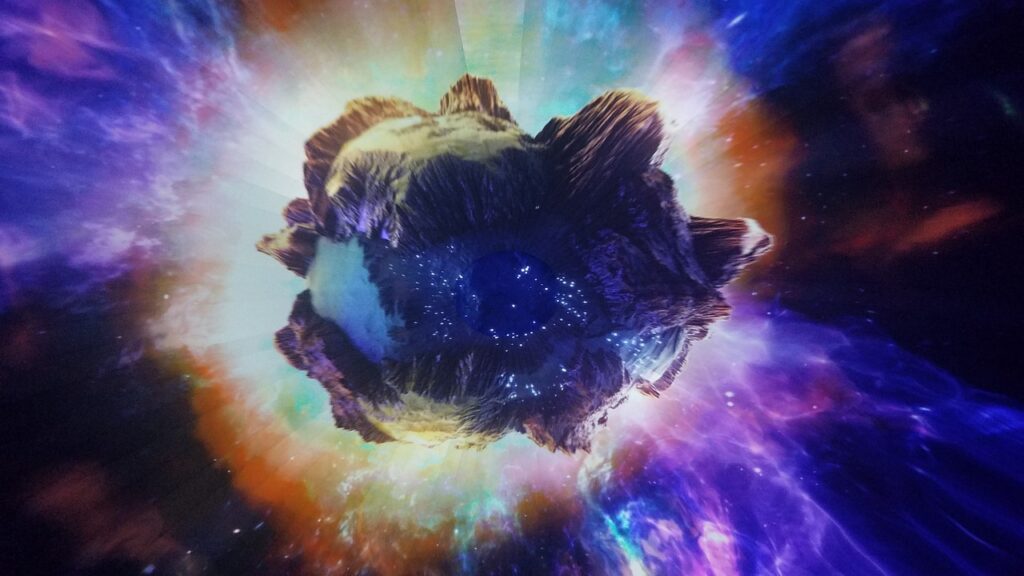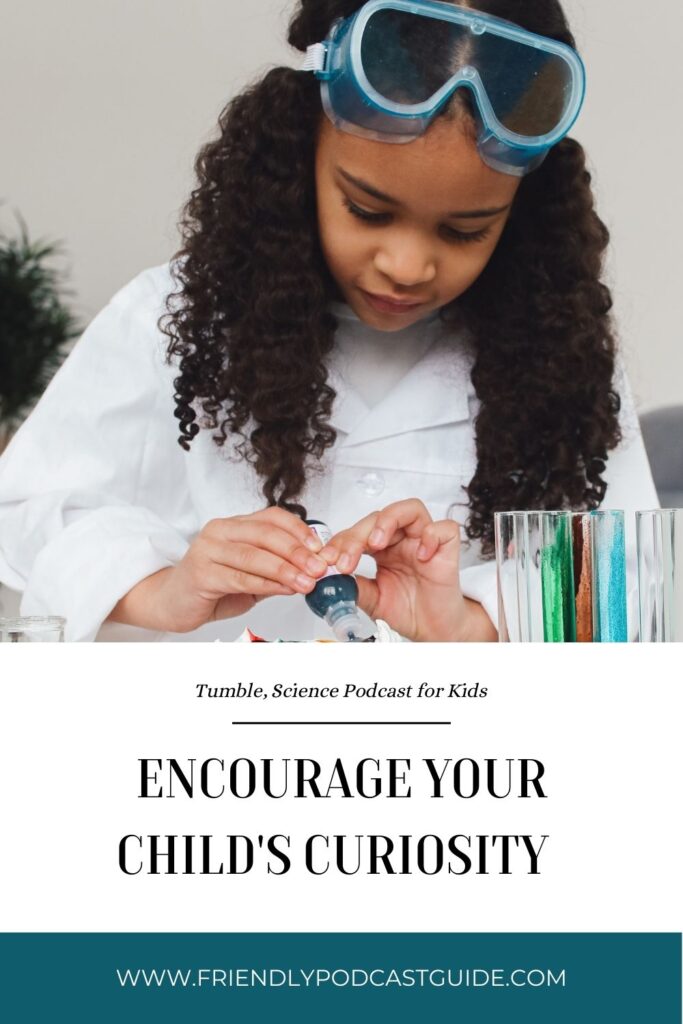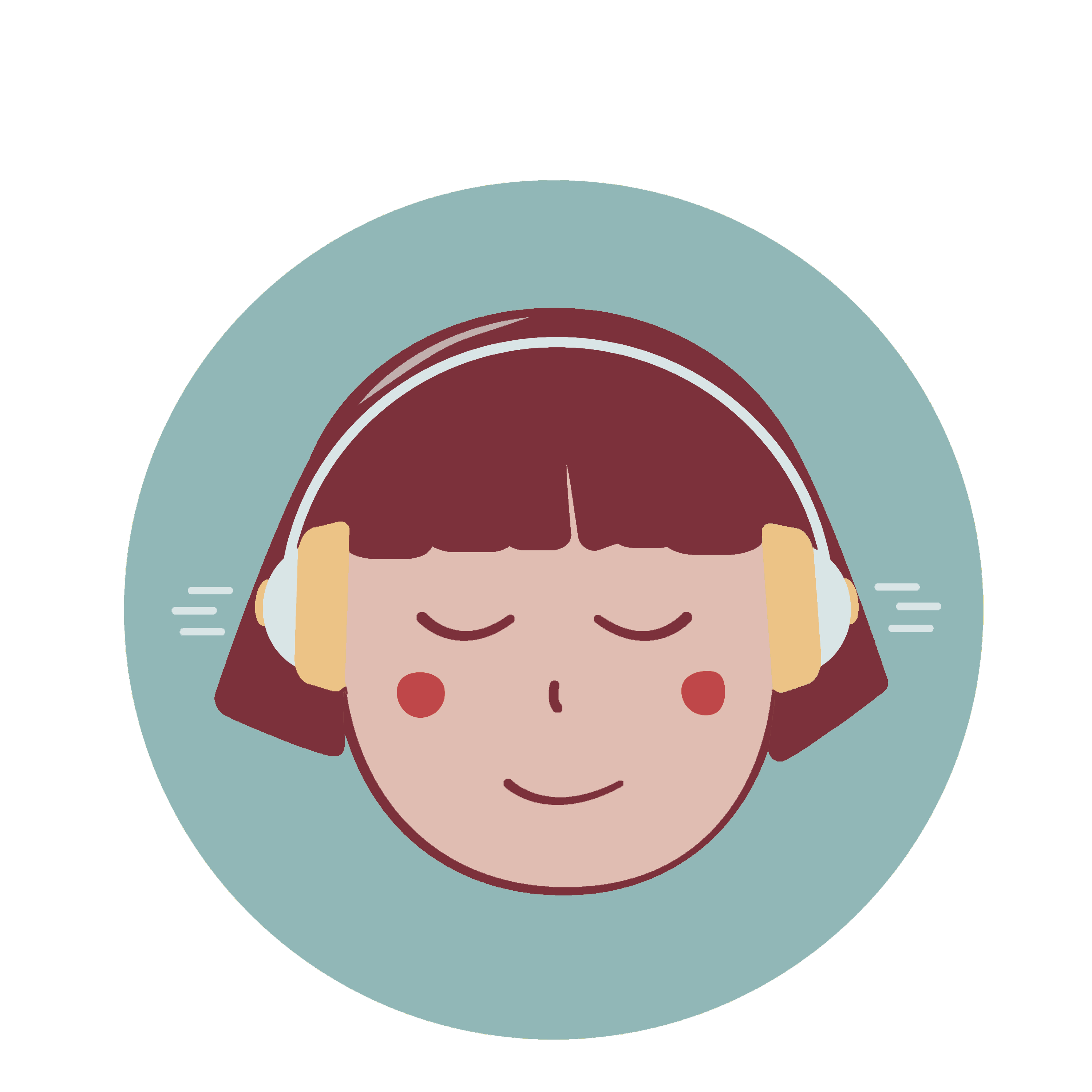One of my favorite ways to encourage my kids’ curiosity is through science kid podcasts. Today’s episode is about a fabulous kid podcast all about science called Tumble.
Hearing real world stories from scientists helps to engage children and get them excited about tuning in. From cats to dinosaurs, there is an episode for everyone to enjoy.

Links from this Episode:
- Tumble Website
- Tumble in Espanol Website
- Tumble on Spotify
- Tumble on Apple Podcasts
- Why Do Cats Purr Episode
- The Dinosaur Asteroid Episode
- Audio Course
- Guide to Kid Podcasts
Hosts Lindsay and Marshall describe the show like this, exploring science stories of discovery, Tumble is a science podcast created to be enjoyed by the entire family. The length of each episode is about 20 minutes.
Guide to Kid Podcasts
One of my favorite parenting tools is kid podcasts. I use them when I’m running errands with the kiddos to keep them from complaining the whole time. When I need a mom break, I’ll just grab an easy activity like coloring pages or a sensory bin, turn on a kid podcast and the kids will be entertained for at least half an hour.
I know that kid podcasts would help you in your life too, which is why I made a Guide to Kid Podcasts. There are eight categories ranging from science to mindfulness to audio drama with at least three podcasts in each category. There are 27 podcasts in total on the guide. I’ve listened to each of the podcasts on this guide, so I can attest to them being kid friendly. I put my email at the bottom of the guide so that if you try a couple with your kids and none of them are a good fit, you can email me and I will personally help you find a kid podcast that works for your littles and you. You can grab this guide at the link at the top of this post.
The Brains Behind Tumble
I’m Marshall and I’m married to Lindsay. Prior to working on this podcast, I was a teacher for 17 years. As a teacher I bounced around all sorts of subjects, but mostly spent my time teaching music. As a result, I do all the music and the goofy teacher jokes for the podcast. I do everything within the very narrow range of jokes that teachers or dads would tell.
I’m Lindsay, and my background is in science journalism and audio reporting. I am one of the co-hosts for Tumble Science Podcast for Kids. I get to do all the interviewing of scientists and writing the show. My background is in science reporting, but I really did not like science when I was growing up in school. I thought it was just a collection of facts, something I had to memorize. I thought of it like those boldface words in a textbook and that I had to get a good enough grade on to move on. Having a strong understanding about science and that science didn’t have all the answers to every question about the Earth and the universe didn’t happen until after I had graduated from college. This changed when I was working in journalism and got the chance to interview a scientist.
Science Impacts the Real World
During that interview, I found out that scientists were working on and solving issues that I cared about by using science as a lens to solve problems. There were indeed still things we did not know about the world. Science was actually relevant to my life. That’s something I never understood in so many years of schooling and I saw that as just a gigantic disconnect and a disservice because science is all around us every day. Science has a huge influence on our daily lives and our future and the kind of future that we want to grow up in. That’s especially important for kids to understand. That is sort of what is at the base of Tumble. We are working on improving science literacy for the next generation.
To do that, we try to tell the most fun and interesting science stories about real world scientists working on research and humanize the scientists that are telling the stories. It’s not science up on a pedestal of particular geniuses in the past. We show that science is a process that’s going on right now and it’s done by normal everyday people who have lives.
Encouraging Exploration
One or two things that we really want people to get out of the show, is first, when the show is over for them to keep talking as a family. Whatever the topic is, keep thinking about it and keep exploring. If it’s interesting to you, as yourself, what more can we find out about this? I think that’s one big thing. Another thing is the idea that science is an ongoing process. That whatever we have on our show is just what we know right now and it’s constantly changing. It’s more about using experimentation and observation to discover more about the universe. It’s not, here’s all the facts, boom. It’s not, if you memorize this book, you know science, and then there’s a test at the end of the semester.
Science is a Process
We really want to drive home that message that science is something where it is more important to understand the process than it is to understand every particular detail about it. We’re also widening that to understand how science works in the world and how science influences society. Also how the decisions that are being made now will affect the future. There are so many ways that science can help solve problems, but it can also cause problems.
So how do you think about that? How do you develop the critical thinking skills to not say that anything science is good, or anything science is bad, but really have an understanding of the decision making that results in outcomes of good or bad or everything in between. We are living in a very complex world. Kids are growing up to inherit that complex world and they need to have the skills to understand it in the same ways that we need the skills to understand reading the news every day.
It’s a topic of literacy. It’s also important to know that some animals only have a butt sometimes. That’s another take away. It’s just something that can enrich your life.
Good Vibes Only
This podcast is about only good vibes. I was actually talking to someone while I was hanging out watching my son do soccer practice who had listened to the show. They were like, do you guys have fun when you’re recording because it really sounds like you’re having a great time. I told him that we do. I think that sums it up in a nutshell, sounds like you’re having a great time.
We cover silly and serious topics and we try to bring a lot of levity to whatever we’re talking about so that it’s something that’s pleasurable to listen to. Even when I listen back to old episodes, I have a smile on my face the whole time. That’s when I know that we’ve hit our target, is when I’m smiling.
Keep in Touch with Tumble
We are wherever you get podcasts. We also have a website, sciencepodcastforkids.com. So just search for Tumble Science Podcast for Kids and our logo has a magnifying glass on it with a blue background. That’s how you find us. We also have Tumble in Espanol that has adaptations of 10 or 11 episodes so far.
If you want to listen in Spanish we offer transcripts in episodes that are both in English and in Spanish so you can practice your Spanish learning if that’s what you want to do.
Why Do Cats Purr
One of my favorite things is an episode we just did a rebroadcast of called Why Do Cats Purr. It was such a journey for me to study and find cat purr scientists. It’s a startlingly difficult question. I had to find three experts rather than our normal expert which we like to feature. I went on a full cat purr exploration. It ended up with the proprietor of the website, purring.org, who is a real character. It gets at both the nature of science and the limitations of science, because it is very hard to study cats.
They’re all around us, but they are impossible to do anything with. There’s no consensus on why cats make this very signature sound or why other types of other species of cats roar. It seems like they can’t do both. You either purr or you roar and the episode is full of funny stories about people studying cats, interacting with cats, and ultimately throwing up their hands and being like, we don’t know. Cats win and they will remain a mystery
Dinosaur Asteroid
I would say my favorite is a crowning achievement which is The Dinosaur Asteroid episode. For that episode, right before it came out, I had listened to an episode of the podcast 20,000 Hertz. It is all about sound design and engineering and all that stuff. It was about the sounds from Star Wars and how those sounds were collected. I was listening to that and I thought that maybe this, this episode about the dinosaur asteroid is an opportunity to try doing that. We had the sequence where Lindsay’s explaining the last day of the dinosaurs and the asteroid. She was talking about what happened to it in space and then when it landed. I spent way, way too much time kind of creating that in sound. It wound up being this exercise for me that now for every episode I do a little bit of that. Since then, I haven’t done anything that intensive.
I will say though, we love all of the episodes and we’ve been doing this for seven, eight years now. We’re still creatively excited about it and feel like we’re very much in an ongoing evolution of the show. The topics that we cover and the messages that we’re trying to raise are very dynamic. Our society has changed so much over the past eight years so there’s always something fresh. Kids often go back and listen to the entire series, which is incredible.
We still have an infinite amount to say and to write about and to joke about and more puns to be made for sure.
To Be Enjoyed from Toddlers to Teens
I’m always imagining that we’re talking to a fourth grader. Our audience range goes from three to 13 and I think people at either end of that spectrum still get something out of the show. Childless adults also have reported enjoying it too, as well as science teachers.
For the three year old, a lot of things are gonna be flying over their head. Some 13 year olds, if they care about being cool they might not be into it. Everybody else I think will enjoy it, it’s really for the whole family.
Discover the Universe
We are going to be coming out with an audio course, a free audio course. It is about discovering the size of the universe and it’s really creative. It’s a little bit different from what you’ll hear on the podcast. It also has materials that go along with it so that kids can become sky watchers as they hear about stories of astronomers from the past. It is linked at the top of this blog.

Share With a Friend
Thank you for listening to this episode. If you know someone or a family who could use Tumble in their life, will you share this episode with them? Also, if you want to learn about more kid podcasts, grab my Kid Podcast Guide linked above.
